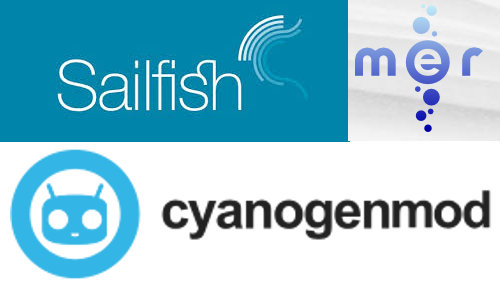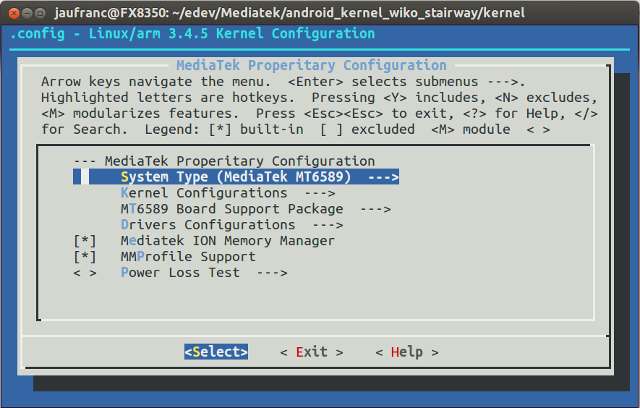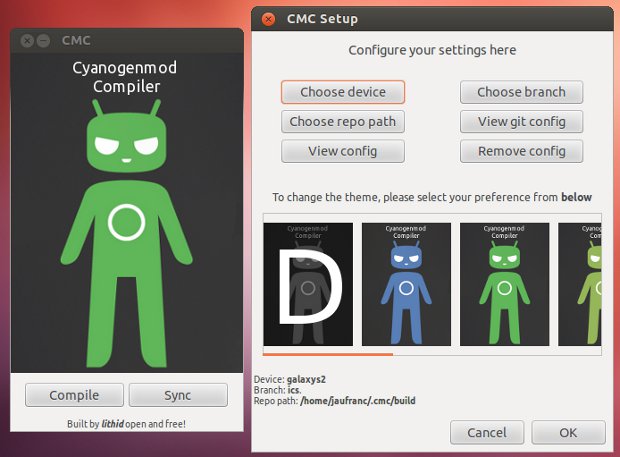Jiayu S3 and S3 Plus are your typical Android smartphones powered by Mediatek MT6752/MT6753 octa core Cortex A53 processor with 3GB RAM, 16GB flash, and a 5.5″ touch screen display. The news here is that Jiayu Germany (a reseller, not the manufacturer), and Team M.A.D (Mediatek Android Developers) comprised of XDA members, have releasing three custom ROMs based on Android 6.0.1 for the smartphone: Cyanogenmod13, Paranoid Android (AOSPA) and AICP (Android Ice Cold Project), which contrast with my Iocean MT6752 smartphone still stuck on Android 4.4.4. I’ll reproduce the technical specifications of Jiayu S3+ phone for reference: SoC- Mediatek MT6753 Octa-core 64-bit ARM Cortex A53 processor @ 1.3 GHz, with ARM Mali-T720 GPU System Memory – 3GB RAM Storage – 16 GB eMMC + micro SD slot up to 64GB Display – 5.5” IPS capacitive touchscreen display; 1920×1080 resolution Connectivity – 802.11 b/g/n/ac Wi-Fi , Bluetooth 4.0, GPS / A-GPS, FM Radio Cellular […]
$142 Micromax Yureka Cyanogen OS Smartphone Features a 64-bit Qualcomm Processor
Micromax is one of the leading smartphone companies in India, battling with Samsung for the top spot, and they’ve recently announced Yureka, a 64-bit smartphone with Qualcomm Snapdragon 615 processor, and Cyanogen OS 11 selling for just 8,999 Rupees (~$142 US) in India. Yureka smartphone specifications: SoC – Qualcomm Snapdragon 615 (MSM8939) octa core Cortex A53 processor with Adreno 405 GPU, and Hexagon V50 DSP System Memory – 2GB DDR3 Storage – 16GB internal storage + micro SD slot up to 32GB Display – 5.5″ IPS display with Corning Glass 3, 1280×720 resolution Cellular Connectivity LTE TDD B40 2300 MHz / B3 1800 MHz (150 Mbps DL / 50 Mbps UL) WCDMA 900/2100 MHz (42 Mbps DL/ 11 Mbps UL) GSM 900/1800/1900 MHz Dual SIM (micro) Wireless Connectivity – 802.11 b/g/n Wi-Fi, Bluetooth 4.0, GPS, FM radio Camera – 13MP rear camera with autofocus and flash, 5MP front-facing camera USB […]
Jolla Releases Sailfish OS Hardware Adaptation Development Kit for Android (CyanogenMod)
If you don’t quite have the spare cash to buy a Jolla Phone, or don’t own a Nexus 4, but still want to try Jolla’s Sailfish OS on your smartphone, here’s your chance, as Jolla has just released their “Sailfish OS Hardware Adaptation Development Kit”, which allows you to install Sailfish OS on any Android phone that supports CyanogenMod 10.1. The development kit is comprised of: Mer core – The Linux userspace core Android Hardware Adaptation (HA/HAL), consisting of: Device-specific Android Kernel Binary device drivers taken from an Android ROM (e.g. CyanogenMod) The libhybris interface built against the binary drivers Middleware packages depending on hardware-specific plugins A Qt/Wayland QPA plugin utilizing the Android hwcomposer Sailfish OS component You’ll a smartphone and a build machine matching the following hardware and software pre-requisites: Smartphone ARMv7 Android device officially supported by CyanogenMod 10.1.x Means to do backup and restore of the device contents […]
Mediatek MT6589 Linux Source Code, CyanogenMod 11 Image for Wiko Stairway Smartphone
Mediatek and their customers have still not gotten into the habit of complying with the GPL license, and releasing the relevant source code such as the Linux kernel. There appears to be at least one smartphone, Wiko Stairway, where the Linux kernel has been released, and chrmhoffmann, a members of XDA developers forums, has even released on unofficial CyanogenMod 11 ROM (Android 4.4.2 Kit Kat) for the device. There are three source repositories for the Linux kernel, “android device“, and Android. I’ve only looked into the kernel which is version 3.4.5. Mediatek has apparently messed up the Linux kernel quite a bit, and you’ll have to do some funny things to build the kernel, and all Mediatek options in menuconfig are in a sub-section called “Mediatek Properitary Configuration” (sic.), and it’s not possible to simply go to System Type menu to change the processor type for instance. Let’s get the […]
Geeksphone Revolution Multi OS Smartphone Supports Android, Firefox OS, and Soon More…
Geeksphone, the company behind the earlier Firefox OS developer’s phones, and the privacy-enhanced Blackphone, has now officially launched the Geeksphone Revolution powered by a dual core Intel Atom Z2560 processor and supporting Android, Firefox OS, or more exactly Boot2Gecko (B2G), and potentially other OS supported by the community such as Sailfish OS. Geeksphone Revolution specifications: SoC – Dual core Intel Atom processor Z2560 up to 1.6GHz System Memory – 1GB LPDDR2 Storage – 4GB EMMC + MicroSD support, Up to 32GB Display – 4.7″ IPS LCD Multi-touch, qHD resolution. Cellular network – HSPA/WCDMA: 2100/1900/900/850 MHz, GSM/GPRS/EDGE: 850/900/1800/1900 MHz, HSDPA up to 21Mbps, HSUPA up to 5.76Mbps, GPRS Class 12 / EDGE Class 12 Connectivity – WiFi 802.11 b/g/n, Bluetooth Class 3.0, GPS, AGPS Camera – 8 MP rear camera with LED Flash, 1.3 MP front camera System I/O – 3.5mm audio jack, micro USB Sensors – G‐Sensor + E‐Compass + […]
AllWinner Linux-sunxi Community Presentation and Status Report – FOSDEM 2014
Oliver Schinagl, a member of linux-sunxi community working on open source kernel and bootloader for AllWinner SoCs, has given a presentation of the community at FOSDEM 2014 to give an overview, and show what progress has been made to date. I’ll write a summary in this post, but if you want to watch the video and/or access the slides scroll down at the bottom of the post. After explaining what sunxi is, and introducing himself, he gave some information about AllWinner and their SoCs: Founded in 2007 in Zhuhai, Chiang now with 550 employees including 450+ engineers 15% market share in 2013 for tablet SoCs, only behind Apple. Products: F-series SoC (2010), A10 (2011), A13, A10s (2012), and A20 (2013). (cnsoft He skipped A31(s) and A80 here as they are not really supported by the community). They list “Open Source Source” and “GPLv3” in their marketing materials although they clearly […]
Build Your Phone Android Distro with CyanogenMod Compiler 0.4 GUI (Cmc-pygtk) for Ubuntu
Lithid, a member of XDA Developers Forum, has recently released the 4th version of a GUI tool (Cmc-pygtk) to build Android for a given smartphone as long as it is supported by CM. The CyanogenMod Compiler is supported by Ubuntu 10.04 32/64-bit and greater, and you can either download a deb file or build it yourself by following the instructions below: Install dependencies:
|
1 2 3 4 |
sudo apt-get install build-essential devscripts ubuntu-dev-tools debhelper \ dh-make diff patch cdbs quilt gnupg fakeroot lintian pbuilder piuparts \ flex bison gperf libsdl1.2-dev libesd0-dev libwxgtk2.6-dev squashfs-tools \ libncurses5-dev zlib1g-dev openjdk-6-jdk pngcrush schedtool |
Clone the source tree:
|
1 |
git clone git://github.com/lithid/Cmc-pygtk.git |
Generate a gpg key:
|
1 |
keygpg --gen-key |
Delete the changelog or dpkg will use lithid key instead.:
|
1 2 |
cd Cmc-pygtk rm os-versions/common/changelog |
Edit the EMAIL field in the Makefile and replace it with the one used to generated the gpg key. Build it for your version of Ubuntu. For Ubuntu 12.04 32-bit:
|
1 |
make cmc-12.04-32 |
And install it:
|
1 2 |
cd out sudo dpkg -i cmc-12.04-32-v0.4.deb |
Before using CyanogenMod Compiler (CMC) is installed, you need to install google repo tool:
|
1 2 3 |
curl https://dl-ssl.google.com/dl/googlesource/git-repo/repo > repo chmod a+x repo sudo mv repo /usr/local/bin/repo |
Now that everything is setup, you can run CyanogenMod Compiler: cmc A disclaimer message telling […]
Android Kernel Source Released for HP TouchPad
The CyanogenMod team has been working on an Android port for the HP TouchPad for a while, and although good progress has been made, the firmware is still considered alpha due to issues with hardware and driver support. There are 2 versions: CM 7 (Alpha) with Android 2.3 and CM 9 (Alpha) with Android 4.0. The CM7 version is more complete and stable than CM9. The Android port might be sped-up as following pressure from the developer community, Hewlett Packard has released the Android kernel source and some other GPL packages modified for the HP TouchPad. Apparently, HP used those for factory testing. The source code is available on github at https://github.com/dalingrin/hp-kernel-tenderloin/tree/hp-topaz-android “green” user at rootzwiki built the kernel binary which is available at http://crimea.edu/~green/TP/oss-db910-QC1065-Kernel.tar.bz2 They also have the source code for: androidvncserver: http://crimea.edu/~green/TP/oss_db910_vnc.tar.bz2 i2c-tools: http://crimea.edu/~green/TP/oss_db910_i2c.tar.bz2 Apparently all components needed are available, except the wifi driver (Atheros AR6003), which HP […]










